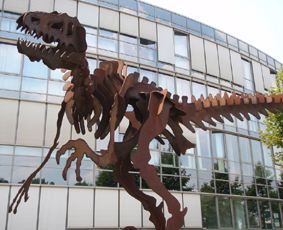If there’s no “free will,” are humans “just” input-output machines? Not at all: the secret is complexity.
There was an article in the UK Telegraph recently, with the adventurous headline Neuroscience, Free Will and Determinism: “I’m Just a Machine”, about the research into remote-controlling muscles by an outside force and its ramifications for the concept of “free will” by Patrick Haggard, professor at the Institute for Cognitive Neuroscience and, as the Telegraph puts it, “Britain’s leading neuroscientist.”
Here’s a taste:
What does this mean in terms of free will? “We don’t have free will, in the spiritual sense. What you’re seeing is the last output stage of a machine. There are lots of things that happen before this stage—plans, goals, learning—and those are the reasons we do more interesting things than just waggle fingers. But there’s no ghost in the machine.”
The conclusions are shocking: if we are part of the universe, and obey its laws, it’s hard to see where free will comes into it. What we think of as freedom, he says, is a product of complexity. “An amoeba has one input, one output. If you touch it with one chemical, it engulfs it; with another, it recoils.
So we’re one input—one output machines, then? Not at all:
“If you see a light go green, it may mean press the accelerator; but there are lots of situations where it doesn’t mean that: if the car in front hasn’t moved, for example. The same stimulus sometimes makes me press the accelerator, but sometimes the horn. We are not one output-one input beings; we have to cope with a messy world of inputs, an enormous range of outputs. I think the term ‘free will’ refers to the complexity of that arrangement.”
I couldn’t agree more with Patrick Haggard. Also, I think we should concern ourselves less with possible answers, but possible questions. I’m pretty sure the question of “free will” just isn’t the right question, a red herring even, when exploring consciousness.
Any attempt at salvaging “free will” from the dustbin of discarded theories, including quantum voodoo, has to tacitly assume at least some sort of Cartesian mind-body distinction, and such a distinction is just not what we see. What we do see is that this “me” is an epiphenomenon of bodily functions, i.e., functions of our brains, that this “me” seems to work like a projection, or a memeplex in form of a “selfplex,” or whatever model or conceptual figure you choose to apply. Which doesn’t mean that this “me” isn’t real, of course it is real, but it’s not real the way we think it’s real.
But whatever models we’ll finally arrive at when we’ve found the right questions, I think we can be reasonably sure that “will” can no more be modified by the class of adjectives “free” belongs to than can “sadness” or “blood pressure.”
If you have something valuable to add or some interesting point to discuss, I’ll be looking forward to meeting you at Mastodon!

